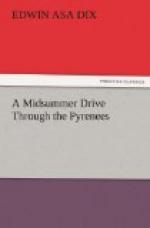Writers uniformly take a wicked pleasure in maligning the Basque language. Its spelling and syntax, its words and sentences, its methods of construction, are openly derided. Unusual word-forms and distended proper names are singled out and held up to jeers and contumely. A Spanish proverb asserts that as to pronunciation the Basques write “Solomon” and pronounce it “Nebuchadnezzar.” The devil, it is alleged, studied for seven years to learn the Basque tongue; at the end of that time he had mastered only three words and abandoned the task in disgust. “And the result is,” adds a vivacious writer, “that he is unable to tempt a Basque, because he cannot speak to him, and that consequently every Basque goes straight to heaven. Unfortunately, now that the population is beginning to talk French, (which the devil knows terribly well,) this privilege is disappearing.”
Overhearing disjointed Basque phrases on the Biarritz beach or here in the streets and cafes of St. Jean, one will not blame the devil’s discouragement. There is scarcely one familiar Aryan syllable. For centuries their speech was not even a written one; there is said to be no book in Basque older than two hundred years. But, its strangeness and isolation once allowed for, there is in reality much to defend in the Basque language. As spoken, it is far from being harsh, and falls pleasantly, often softly, on the ear; the sounds are clear, the articulations rarely, hurried as with the French. The words, other than a few proper names, do not exceed a sober and reasonable length, and as to spelling, every letter has its assigned use and duty; there are no phonetic drones. The original root-forms are short and always recognizable; the full words grow from these by an orderly if intricate system of inflections and the forming of derivatives.
The inflections are, it must be admitted, intricate. Each noun boasts two separate forms, and each of its declension-cases keeps a group of sub-cases within reach for special emergencies. There are only two regularly ordained verbs,—“to be” and “to have”; but they don different canonicals for each different ceremony, and their varying garbs seem fairly without limit. In the Grammaire Basque of M. Geze, published in Bayonne, I count no less than one hundred and eight pages of closely-set tables needed to paint the opalescent hues of these multiform auxiliaries,—and this only in one dialect, out of six in all. M. Chaho, an essayist of weight and himself a Basque, informs us artlessly and seriously that one counts a thousand and forty-five forms for their combined present indicatives, and a trifle over ten thousand forms for the two fully expanded verbs; and yet the language, he hastens to add, is so magically simple that even a Basque child never makes an error!
As to its appearance in print, the reader may judge for himself, for here is one of their favorite love-songs. These light songs abound, many being surprisingly delicate and dainty.




